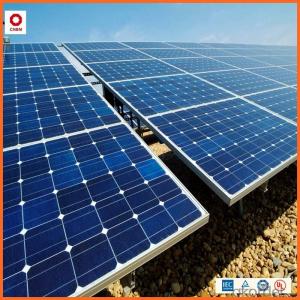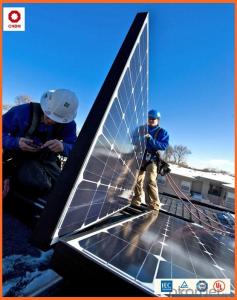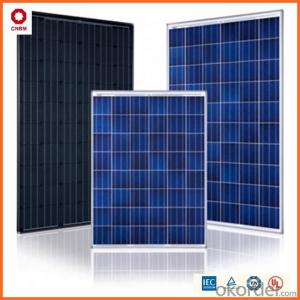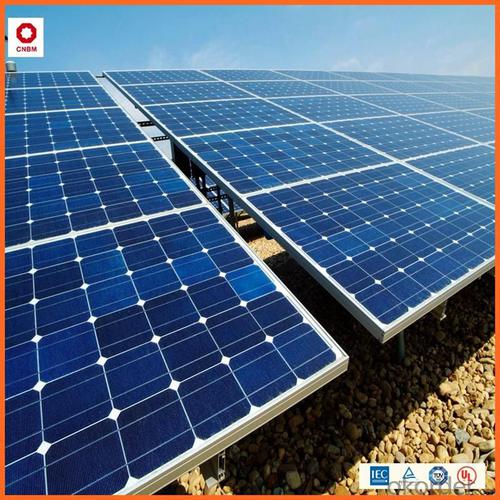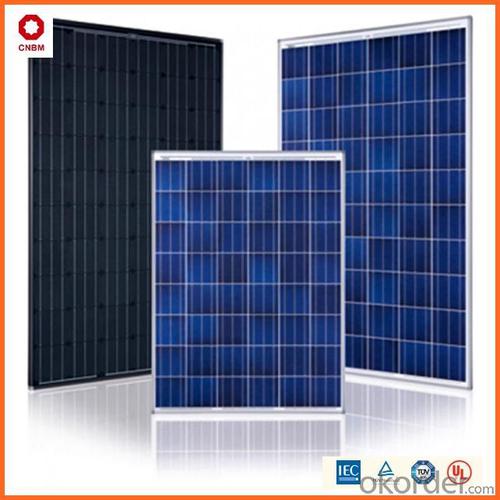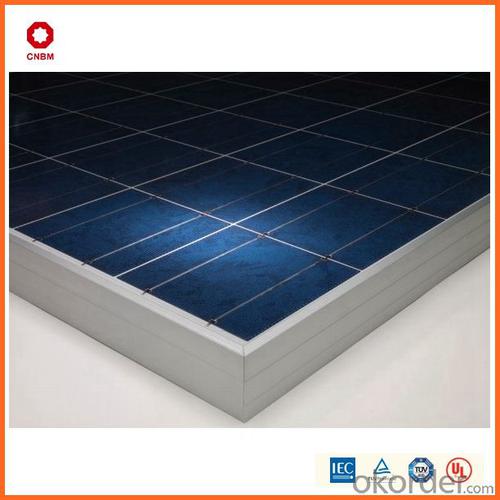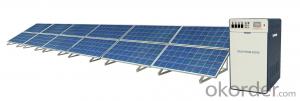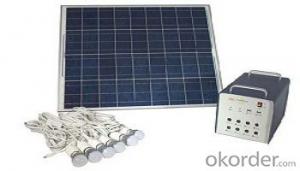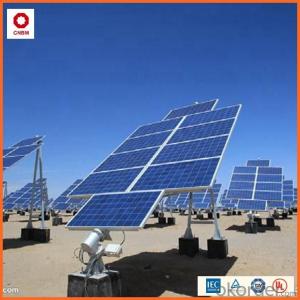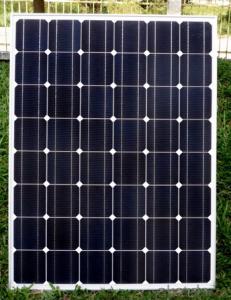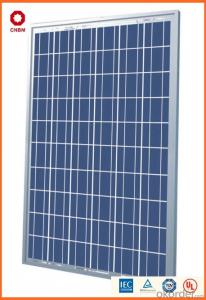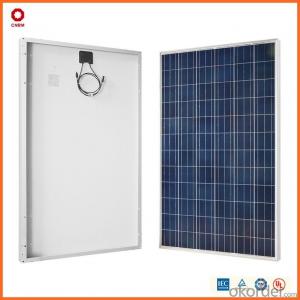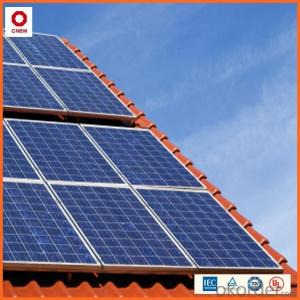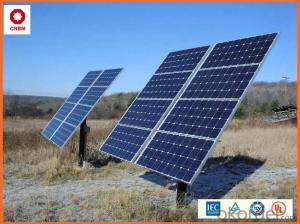A Solar Energy Systems:!!! Hot on Sale!!! Stock 315W Poly Solar Panel USD0.46/W A Grade Good Solar Panel On Sale
- Loading Port:
- China main port
- Payment Terms:
- TT OR LC
- Min Order Qty:
- 1 watt
- Supply Capability:
- 10000000 watt/month
OKorder Service Pledge
OKorder Financial Service
You Might Also Like
Product Description:
Hot Sale !!! Quality and Safety of 245w-320w Poly Solar Panel
1. Rigorous quality control meets the highest international standards.
2. High-transmissivity low-iron tempered glass, strong aluminium frame.
3. Using UV-resistant silicon.
4. IS09001/14001/CE/TUV/UL
Warranties of 245w-320w Poly Solar Panel
1. 10 years limited product warranty
2. 15 years at 90% of the minimal rated power output
3. 25 years at 80% of the minimal rated power output
Technical date of 245w-320w Poly Solar Panel
ITEM NO.: | Mono 125*125 cell ,36pcs . Power range from 80Wp-100Wp | ||||||||
Maximum Power(W) | 80 | 85 | 90 | 95 | 100 | ||||
Optimum Power Voltage(Vmp) | 17.81 | 17.89 | 17.94 | 17.99 | 18.06 | ||||
Optimum Operatige Current(Imp) | 4.78 | 4.91 | 5.12 | 5.35 | 5.59 | ||||
Open Circuit Voltage(Voc) | 21.98 | 22.05 | 22.14 | 22.28 | 22.45 | ||||
Short Circuit Current(Isc) | 4.95 | 5.15 | 5.36 | 5.65 | 5.84 | ||||
Solar Cell: | 125*125 Mono | ||||||||
Number of Cell(pcs) | 4*9 | ||||||||
Brand Name of Solar Cells | JA Cell, Bluesun Cell | ||||||||
Size of Module(mm) | 1580*808*35 | ||||||||
Caple & Connector Type | Pass the TUV Certificate | ||||||||
Frame(Material Corners,etc.) | Aluminium-alloy | ||||||||
Backing (Brand Type) | TPT | ||||||||
Cell Efficiency for 100W(%) | 15.8% | ||||||||
Weight Per Piece(KG) | 12.0KG | ||||||||
FF (%) | 70-76% | ||||||||
Junction Box Type | Pass the TUV Certificate | ||||||||
Tolerance Wattage(e.g.+/-5%) | ±3%, or 0-3% | ||||||||
Front Glass Thikness(mm) | 3.2 | ||||||||
Temperature Coefficients of Isc(%) | +0.04 | ||||||||
Temperature Coefficients of Voc(%) | -0.38 | ||||||||
Temperature Coefficients of Pm(%) | -0.47 | ||||||||
Temperature Coefficients of Im(%) | +0.04 | ||||||||
Temperature Coefficients of Vm(%) | -0.38 | ||||||||
Temperature Range | -40°C to +85°C | ||||||||
Surface Maximum Load Capacity | 2400Pa | ||||||||
Allowable Hail Load | 23m/s ,7.53g | ||||||||
Bypass Diode Rating(A) | 12 | ||||||||
Warranty | 90% of 10 years,80% of 25 years. | ||||||||
Standard Test Conditions | AM1.5 1000W/ 25 +/-2°C | ||||||||
Packing | carton or pallet | ||||||||
1*20' | 25 Pallets / 450pcs | ||||||||
1*40'STD | 25 Pallets / 100pcs | ||||||||
Features of our products:
• High conversion efficiency mono/poly-crystalline amorphous silicon solar cells
• Modules incorporate high performance bypass diodes to minimize the power drop caused by shading
• High transmittance, low-iron tempered glass
• High performance EVA encapsulant to prevent destroying and water.
• AI frame: without screw, corner connection. 8 holes on the frame can be installed easily
• Good performance of preventing from atrocious weather such as wind and hails
• Certifications: CE IEC TUV VDE UL, Class I
• 10 years 90% power output warranty

Shipping of 245w-320w Poly Solar Panel
By Sea | Delivery from Shanghai or Ningbo seaport |
By Air | Departure from Shanghai Pudong Airport |
By Express | Post by DHL, EMS, UPS, TNT. |
- Q: Are solar energy systems affected by hail or other weather conditions?
- To some extent, solar energy systems may be impacted by hail or severe weather conditions. Hailstorms have the potential to harm solar panels, especially if the hailstones are large or if the panels lack sufficient protection. The glass covering of solar panels can crack or shatter due to hailstones, resulting in reduced efficiency or complete failure of the affected panels. It is worth noting, however, that solar panels endure rigorous testing and are designed to withstand various weather conditions, including hail. Most panels are constructed to endure hailstones of a specific size and are often tested for impact resistance. Panels that meet international standards generally possess the capability to withstand hailstones up to a certain diameter without experiencing significant damage. Furthermore, advancements in technology have led to the creation of more durable and resilient solar panels. Manufacturers are continuously enhancing the materials used in solar panel construction to improve their ability to withstand hail, extreme temperatures, and other weather-related challenges. In areas prone to hail or severe weather, additional precautions can be taken to minimize the risk of damage. These precautions may involve using hail-resistant glass, installing protective screens or barriers, or adjusting the tilt of the solar panels to reduce hail exposure. Overall, while hail or severe weather conditions can impact solar energy systems, the likelihood of damage is generally considered low, particularly when systems are properly installed and tested. Moreover, the long-term benefits and environmental advantages of solar energy outweigh the potential risks associated with weather-related damage.
- Q: Can solar energy systems be used for powering greenhouses?
- Yes, solar energy systems can definitely be used for powering greenhouses. Solar panels can be installed on the roof or walls of a greenhouse to capture sunlight and convert it into electricity. This renewable energy can then be used to power various systems within the greenhouse, such as ventilation, heating, cooling, and lighting. Solar energy offers several advantages for powering greenhouses. Firstly, it is a clean and sustainable source of energy, which helps reduce greenhouse gas emissions and environmental impact. Secondly, solar power is reliable and abundant, especially in regions with ample sunlight. This means that greenhouses can have a consistent and uninterrupted power supply, even in remote or off-grid locations. Additionally, solar energy systems can help reduce operating costs for greenhouse owners. Once the initial investment in solar panels and equipment is made, the ongoing energy costs are significantly lower compared to traditional fossil fuel-based systems. This can lead to substantial long-term savings, especially for larger-scale commercial greenhouses. Moreover, solar energy systems can be integrated with energy storage solutions, such as batteries, to store excess energy generated during the day. This stored energy can then be used during cloudy periods or at night, ensuring a continuous power supply for the greenhouse. Overall, solar energy systems are a viable and sustainable option for powering greenhouses. They offer numerous benefits, including reduced environmental impact, reliable energy supply, cost savings, and the ability to integrate with energy storage solutions.
- Q: Do solar energy systems require a lot of space?
- Solar energy systems do not necessarily require a lot of space. The space required for a solar energy system depends on various factors such as the energy needs of the building or facility, the efficiency of the solar panels, and the available sunlight. For residential solar energy systems, the space required can vary depending on the size of the roof and the energy consumption of the household. Many residential solar installations can be done on rooftops, utilizing the existing space without the need for additional land. In some cases, ground-mounted systems may be used if there is enough space available. On the other hand, utility-scale solar energy systems that generate power for large communities or commercial facilities may require larger areas of land. These systems typically use large arrays of solar panels and require a significant amount of space to maximize energy production. However, it is worth noting that with advancements in solar panel technology, the efficiency of solar panels has increased, allowing for more power to be generated from a smaller area. Additionally, solar panel installation techniques have also improved, allowing for more flexibility in system design and placement. In summary, while solar energy systems may require some space, the amount of space required depends on several factors and can be tailored to fit the specific needs and available resources of a particular installation.
- Q: Can solar energy systems reduce electricity bills?
- Yes, solar energy systems can reduce electricity bills. By harnessing the power of the sun to generate electricity, homeowners and businesses can significantly offset their reliance on grid-supplied electricity, resulting in lower utility bills.
- Q: Can solar energy systems be used in areas with limited access to storage solutions?
- Yes, solar energy systems can still be used in areas with limited access to storage solutions. In such cases, the solar energy generated can be used directly for immediate consumption rather than being stored. This can be particularly beneficial for powering devices and appliances during daylight hours, reducing reliance on traditional energy sources and minimizing grid dependency. Additionally, advancements in technology are continuously improving storage options, making them more accessible and affordable for areas with limited resources.
- Q: Can solar energy systems be used for powering data centers or server farms?
- Yes, solar energy systems can definitely be used for powering data centers or server farms. In fact, many organizations are increasingly adopting solar power as a sustainable and reliable source of energy for their data centers. Solar panels can be installed on the roofs or surrounding areas of data centers, converting sunlight into electricity to power servers and other equipment. Additionally, advancements in battery storage technology allow for the storage of excess solar energy to be used during cloudy periods or at night. This not only reduces reliance on traditional energy sources but also helps in reducing carbon emissions and operating costs for data centers.
- Q: Can solar panels be installed on mobile homes or trailers?
- Yes, solar panels can be installed on mobile homes or trailers. In fact, they are a popular option for those seeking to increase energy efficiency and reduce reliance on external power sources. The lightweight and flexible nature of modern solar panels makes them suitable for installation on the roofs of mobile homes and trailers. They can provide a reliable and sustainable source of electricity, making these homes more environmentally friendly and cost-effective in the long run.
- Q: How do solar energy systems affect the roof's lifespan?
- Solar energy systems can actually extend the lifespan of a roof. By providing a protective layer, they shield the roof from weather elements, such as sun exposure, rain, and hail. Additionally, solar panels can help to regulate the temperature on the roof, reducing thermal stress and potentially preventing damage. Overall, solar energy systems can contribute to the longevity and durability of a roof.
- Q: Can solar energy systems be installed in urban areas with limited space?
- Solar energy systems can indeed be installed in urban areas with limited space. Despite the fact that urban areas often have limited rooftop space for solar panel installation, there are several creative solutions that can be used to overcome this challenge. One option is to install solar panels on vertical surfaces like walls or building facades. This approach makes the most of the available space and doesn't require additional land. By utilizing vertical space, solar energy systems can still generate a significant amount of electricity even in densely populated urban areas. Another solution is to implement community solar projects. These projects involve installing solar panels in a centralized location within the urban area, such as a parking lot or vacant lot. The electricity generated by these panels can then be shared among multiple buildings or households, allowing those with limited rooftop space to still benefit from solar energy. Furthermore, advancements in technology have resulted in the development of more efficient and compact solar panels. These panels can generate the same amount of electricity as traditional panels with less surface area, making them more suitable for installation in limited urban spaces. In addition to these solutions, it's important to consider the potential of integrating solar energy systems into existing infrastructure. For instance, solar panels can be installed on top of bus stops, streetlights, or even on the sides of bridges and highways. This allows for the utilization of spaces that would otherwise go unused. In conclusion, although limited space can be a challenge, there are various ways to install solar energy systems in urban areas. With innovative approaches and technological advancements, solar power can be harnessed even in densely populated cities, contributing to a more sustainable and renewable energy future.
- Q: How do solar energy systems affect the structural integrity of a building?
- Solar energy systems have minimal impact on the structural integrity of a building. These systems are usually lightweight and designed to be mounted on rooftops or integrated into existing structures. Proper installation and reinforcement measures ensure that the additional weight and stress are adequately supported, preventing any negative effects on the building's structure.
Send your message to us
A Solar Energy Systems:!!! Hot on Sale!!! Stock 315W Poly Solar Panel USD0.46/W A Grade Good Solar Panel On Sale
- Loading Port:
- China main port
- Payment Terms:
- TT OR LC
- Min Order Qty:
- 1 watt
- Supply Capability:
- 10000000 watt/month
OKorder Service Pledge
OKorder Financial Service
Similar products
Hot products
Hot Searches
Related keywords
